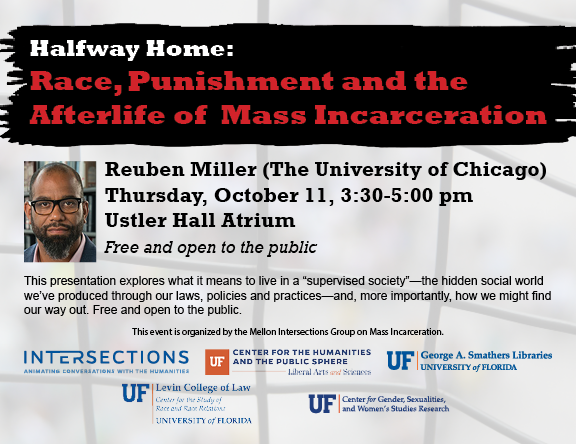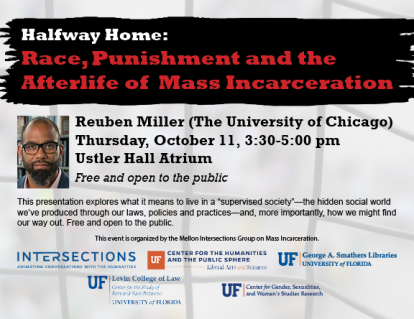
- This event has passed.
Halfway Home: Race, Punishment and the Afterlife of Mass Incarceration
October 11, 2018 @ 3:30 pm - 5:00 pm
Free
 While more people are incarcerated in the United States than in any other nation in the history of the western world, the prison is but one (comparatively) small part of a vast carceral landscape. The 600,000 people released each year join nearly 5 million people already on probation or parole, 12 million who are processed through a county jail, the 19 million U.S. residents estimated to have a felony conviction, and the staggering 79 million Americans with a criminal record.
While more people are incarcerated in the United States than in any other nation in the history of the western world, the prison is but one (comparatively) small part of a vast carceral landscape. The 600,000 people released each year join nearly 5 million people already on probation or parole, 12 million who are processed through a county jail, the 19 million U.S. residents estimated to have a felony conviction, and the staggering 79 million Americans with a criminal record.
Yet the size of the population marked by the carceral state is secondary to its reach. Upon release, incarcerated people are greeted by more than 48,000 laws, policies and administrative sanctions that limit their participation in the labor and housing markets, in the culture and civic life of the city, and even within their families. They are subject to rules other people are not subject to and shoulder responsibilities other people are not expected to shoulder. They, in fact, occupy an alternate form of political membership—what I call “carceral citizenship.” This presentation examines the afterlife of mass incarceration. Drawing on fifteen years of research and practice with currently and formerly incarcerated people and ethnographic data collected in three iconic American cities, this presentation explores what it means to live in a “supervised society”—the hidden social world we’ve produced through our laws, policies and practices—and, more importantly, how we might find our way out. Reuben Miller will also speak with a respondent sharing their own personal experience of life after incarceration.
Reuben Jonathan Miller is an Assistant Professor at the University of Chicago in the School of Social Service Administration and a faculty affiliate at the Center for the Study of Race, Politics and Culture and with the Pozen Family Center for Human Rights. His research examines life at the intersections of race, poverty, crime control, and social welfare policy. He has conducted fieldwork in Chicago, Detroit, New York City, Glasgow and Belgrade, examining how law, policy and emergent practices of state and third-party supervision alter the contours of citizenship, activism, community, and family life for poor black Americans and the urban poor, broadly defined. In 2016, Professor Miller was invited to membership in the School of Social Science at the Institute for Advanced Study. This year, he was selected as an Eric and Wendy Schmidt Fellow at the New America Foundation. He will share findings from Halfway Home, his forthcoming book based on 15 years of research and practice with currently and formerly incarcerated people.
This event is free and open to the public. Please contact Prof. Jodi Schorb (jschorb@ufl.edu) for more information.
This event is sponsored by the Mellon Intersections Group on Mass Incarceration of the Center for the Humanities and the Public Sphere and George A. Smathers Libraries, and the Center for Gender, Sexualities, and Women’s Studies Research, and the Center for the Study of Race and Race Relations.